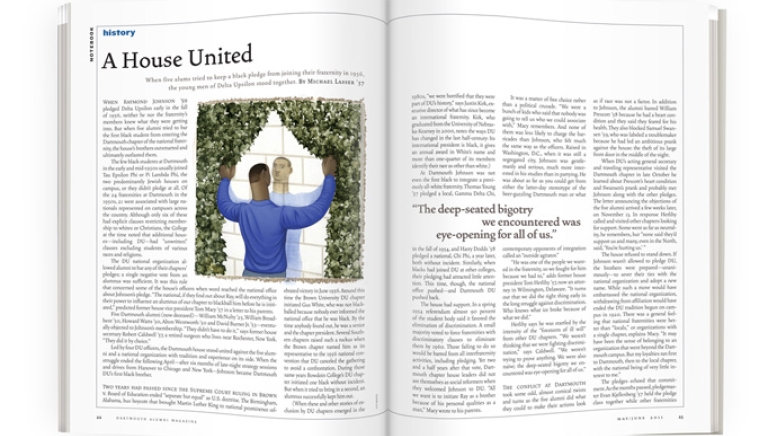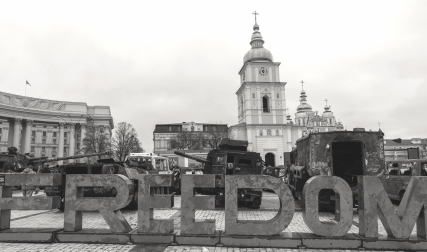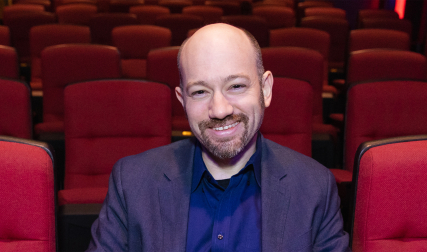When Raymond Johnson ’59 pledged Delta Upsilon early in the fall of 1956, neither he nor the fraternity’s members knew what they were getting into. But when five alumni tried to bar the first black student from entering the Dartmouth chapter of the national fraternity, the house’s brothers outsmarted and ultimately outlasted them.
The few black students at Dartmouth in the early and mid-1950s usually joined Tau Epsilon Phi or Pi Lambda Phi, the two predominantly Jewish houses on campus, or they didn’t pledge at all. Of the 24 fraternities at Dartmouth in the 1950s, 21 were associated with large nationals represented on campuses across the country. Although only six of these had explicit clauses restricting membership to whites or Christians, the College at the time noted that additional houses—including DU—had “unwritten” clauses excluding students of various races and religions.
The DU national organization allowed alumni to bar any of their chapters’ pledges; a single negative vote from an alumnus was sufficient. It was this rule that concerned some of the house’s officers when word reached the national office about Johnson’s pledge. “The national, if they find out about Ray, will do everything in their power to influence an alumnus of our chapter to blackball him before he is initiated,” predicted former house vice president Tom Macy ’57 in a letter to his parents.
Five Dartmouth alumni (now deceased)—William McNulty ’25, William Broadbent ’50, Howard Watts ’50, Alton Wentworth ’50 and David Burner Jr. ’53—eventually objected to Johnson’s membership. “They didn’t have to do it,” says former house secretary Robert Caldwell ’57, a retired surgeon who lives near Rochester, New York. “They did it by choice.”
Led by four DU officers, the Dartmouth house stood united against the five alumni and a national organization with tradition and experience on its side. When the struggle ended the following April—after six months of late-night strategy sessions and drives from Hanover to Chicago and New York—Johnson became Dartmouth DU’s first black brother.
Two years had passed since the Supreme Court ruling in Brown v. Board of Education ended “separate but equal” as U.S. doctrine. The Montgomery, Alabama, bus boycott that brought Martin Luther King to national prominence celebrated victory in June 1956. Around this time the Brown University DU chapter initiated Gus White, who was not blackballed because nobody ever informed the national office that he was black. By the time anybody found out, he was a senior and the chapter president. Several Southern chapters raised such a ruckus when the Brown chapter named him as its representative to the 1956 national convention that DU canceled the gathering to avoid a confrontation. During those same years Bowdoin College’s DU chapter initiated one black without incident. But when it tried to bring in a second, an alumnus successfully kept him out.
(When these and other stories of exclusion by DU chapters emerged in the 1980s, “we were horrified that they were part of DU’s history,” says Justin Kirk, executive director of what has since become an international fraternity. Kirk, who graduated from the University of Nebraska-Kearney in 2000, notes the ways DU has changed in the last half-century: Its international president is black, it gives an annual award in White’s name and more than one-quarter of its members identify their race as other than white.)
At Dartmouth Johnson was not even the first black to integrate a previously all-white fraternity. Thomas Young ’57 pledged a local, Gamma Delta Chi, in the fall of 1954, and Harry Dodds ’58 pledged a national, Chi Phi, a year later, both without incident. Similarly, when blacks had joined DU at other colleges, their pledging had attracted little attention. This time, though, the national office pushed—and Dartmouth DU pushed back.
The house had support. In a spring 1954 referendum almost 90 percent of the student body said it favored the elimination of discrimination. A small majority voted to force fraternities with discriminatory clauses to eliminate them by 1960. Those failing to do so would be barred from all interfraternity activities, including pledging. Yet two and a half years after that vote, Dartmouth chapter house leaders did not see themselves as social reformers when they welcomed Johnson to DU. “All we want is to initiate Ray as a brother because of his personal qualities as a man,” Macy wrote to his parents.
It was a matter of free choice rather than a political crusade. “We were a bunch of kids who said that nobody was going to tell us who we could associate with,” Macy remembers. And none of them was less likely to charge the barricades than Johnson, who felt much the same way as the officers. Raised in Washington, D.C., when it was still a segregated city, Johnson was gentlemanly and serious, much more interested in his studies than in partying. He was about as far as you could get from either the latter-day stereotype of the beer-guzzling Dartmouth man or what contemporary opponents of integration called an “outside agitator.”
“He was one of the people we wanted in the fraternity, so we fought for him because we had to,” adds former house president Tom Herlihy ’57, now an attorney in Wilmington, Delaware. “It turns out that we did the right thing early in the long struggle against discrimination. Who knows what ice broke because of what we did.”
Herlihy says he was startled by the intensity of the “firestorm of ill will” from other DU chapters. “We weren’t thinking that we were fighting discrimination,” says Caldwell. “We weren’t trying to prove anything. We were also naïve; the deep-seated bigotry we encountered was eye-opening for all of us.”
The conflict at Dartmouth took some odd, almost comical twists and turns as the five alumni did what they could to make their actions look as if race was not a factor. In addition to Johnson, the alumni barred William Prescott ’58 because he had a heart condition and they said they feared for his health. They also blocked Samuel Swansen ’59, who was labeled a troublemaker because he had led an ambitious prank against the house: the theft of its large front door in the middle of the night.
When DU’s acting general secretary and traveling representative visited the Dartmouth chapter in late October he learned about Prescott’s heart condition and Swansen’s prank and probably met Johnson along with the other pledges. The letter announcing the objections of the five alumni arrived a few weeks later, on November 13. In response Herlihy called and visited other chapters looking for support. Some went as far as neutrality, he remembers, but “none said they’d support us and many, even in the North, said, ‘You’re hurting us.’ ”
The house refused to stand down. If Johnson wasn’t allowed to pledge DU, the brothers were prepared—unanimously—to sever their ties with the national organization and adopt a new name. While such a move would have embarrassed the national organization, withdrawing from affiliation would have ended the DU tradition begun on campus in 1920. There was a general feeling that national fraternities were better than “locals,” or organizations with a single chapter, explains Macy. “It may have been the sense of belonging to an organization that went beyond the Dartmouth campus. But my loyalties ran first to Dartmouth, then to the local chapter, with the national being of very little interest to me.”
The pledges echoed that commitment. As the months passed, pledgemaster Evan Kjellenberg ’57 held the pledge class together while other fraternities initiated their new members. “On their own they decided to be initiated together or not at all,” says Kjellenberg, who now practices law in Wisconsin. “There was some routine grousing about the delay, but they were standing with Ray.”
Once the struggle was under way Herlihy predicted the chapter would eventually have to go local, and he began to consult with lawyers, faculty members and alumni on the legal ramifications.
One night in January 1957 President John Sloan Dickey ’29 (himself an Alpha Theta man) visited the fraternity for an informal talk. Based on thank-you notes in the College archives, it’s clear Dickey used the occasion to express his approval of the 1954 referendum against fraternity discrimination and affirm his belief that undergraduates, including fraternity members, should handle their own affairs as much as possible. In larger terms, he was deeply committed to the value of free association without outside interference. DU’s fight to initiate Johnson had probably come to his attention the previous November, when Assistant Dean of the College Art Kiendl sent him a confidential memo on the issue. Kiendl’s memo concludes: “I have stated that the College will back the students in whatever they do, so long as it is honorable….Personally, I am incensed by this matter and will try, in a dignified manner, to make it known to Delta Upsilon that we will not stand for this insidious business on our campus.”
Though the “business” would last for several more months, things began to break Dartmouth DU’s way in early December. A Dartmouth group including some of the house officers met in New York City with some of DU’s national officers and attorneys and one of the objecting alumni. “They pulled out some big guns to try to intimidate us,” Macy recalls. The Dartmouth brothers were told the chapter’s alumni had the right to object. After meeting for almost five hours, though, the alum said he was removing his blackball.
By the end of February three more alumni had lifted their vetoes. But David Burner remained adamantly opposed to Johnson’s election. As a result, the Dartmouth chapter prepared to go local.
Before the vote to sever its ties with the national association, the Dartmouth DU leadership polled its 552 alumni as well as members of the 69 other chapters. Most of the chapters opposed the move, but of the 160 replies from Dartmouth alumni there were “141 behind us, 15 opposed and four confused as to our move,” according to Macy. Encouraged by the results, Herlihy initially scheduled the vote for March 6, 1957. He post-poned it while he, Macy and Caldwell drove to Chicago to try to change Burner’s mind. “We thought we could charm his socks off,” Caldwell remembers.
They never had the chance: Burner stayed a step ahead of the brothers as they pursued him unsuccessfully from his apartment building to the law library at the Northwestern University Law School. When the officers returned to Hanover they called Burner, who surprised them by offering to meet in New York City the following weekend. After a lengthy discussion at the Harvard Club in Manhattan that included three representatives from the national office, a break enabled Herlihy to talk one-on-one with Burner. In the end, Burner agreed to drop his blackball if a majority of DU’s 69 chapters did not oppose Johnson’s initiation.
The problem was that DU had a lot of chapters in the South. Earl Ward ’26, a DU alumnus and jeweler in Hanover for many years, suggested the polling question be phrased in a way that would allow chapters, especially in the South, to go along. Its single sentence used the language of the time: “Do you object to our initiating a Negro?” It did not require an affirmation of integration—only an absence of opposition—and that provided the necessary wiggle room. Once the national office approved the question the Dartmouth brothers and pledges fanned out across the country during spring break to visit chapters near their homes and convince those members to vote “no.” Even so, responses to the poll came back so slowly that, Macy remembers, “we ended up calling the last chapters. I’ll never forget the euphoria when we got the final vote late one evening.”
DU Francis “Howie” Howland ’57 remembers someone bursting into his room yelling, “They lifted the blackballs. Let’s go!” Everyone gathered that night to initiate the class “before the national officers could come up with another roadblock,” says Macy. The date was April 23, 1957, more than six months after DU had first chosen its new pledge class.
Following graduation Johnson earned his M.D. from Howard University and enjoyed a distinguished medical career in the U.S. Navy, culminating with three years as the first black commanding officer of the Bethesda (Maryland) Naval Hospital. Nominated by L. Vincent Sawyer ’59 and Sam Swansen ’59—the same Swansen who had stolen the door from the DU house—Johnson received an honorary degree from Dartmouth at Commencement 2009 during his 50th reunion.
Today Johnson speaks quietly and thoughtfully from his home in Groton, Connecticut. He says that he struggled with how the conflict was affecting his fellow pledges and worried about how it would turn out. “I felt that had it not been for me, the class would have been initiated much sooner,” he says. Although the frustrations never became explicit, he was aware that some of the pledges felt “keenly that they wanted the thing over.”
Johnson says he persevered by “focusing on what I had come to Dartmouth for—to pursue my education.” The conflict “had little impact on my studies or my social life or my going to the Nugget,” he says. “The ’57s in DU treated me no differently from the other pledges. I had no inside information. They were willing to go to bat for what they felt was the right thing to do.”
Michael Lasser is a former teacher, writer and host of the National Public Radio show, Fascinatin’ Rhythm. He lives near Rochester, New York.




